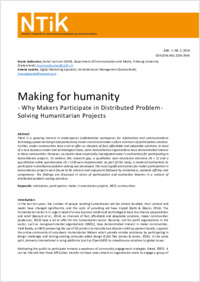Making for humanity : why Makers Participate in Distributed Problem-Solving Humanitarian Projects
BP2-STS
- Asdourian, Bruno ORCID University of Fribourg
- Lazarte, Jimena Vontobel Asset Management (Switzerland)
- 2018
Published in:
- The Nordic Journal of Information Studies and Cultural Communication (NTiK). - 2018, vol. 7, no. 2, p. 32-45
English
There is a growing interest in makerspaces (collaborative workspaces for information and communications technology-powered design and production), maker events and maker culture as drivers of participative creation. Further, maker communities have a lot to offer as channels of fast, affordable and adaptable solutions. In need of a new business model and technological tools, some humanitarian organizations have demonstrated interest in these communities. However, no studies have empirically investigated maker’s motivations for participating in humanitarian projects. To address this research gap, a qualitative semi-structured interview (N = 3) and a quantitative online questionnaire (N = 118) were implemented. As part of this study, a model of motivations to participate in distributed problem-solving was developed. The most significant motives for maker participation in humanitarian projects were found to be interest and enjoyment followed by relatedness, symbolic affinity and competence. The findings are discussed in terms of participation and motivation theories in a context of distributed problem-solving practices.
- Faculty
- Faculté des sciences économiques et sociales et du management
- Department
- Département des sciences de la communication et des médias
- Language
-
- English
- Classification
- Information, communication and media sciences
- Other electronic version
- License
-
License undefined
- Identifiers
- Persistent URL
- https://folia.unifr.ch/unifr/documents/320226
Statistics
Document views: 104
File downloads:
- 2018_Asdourian_Making: 111
